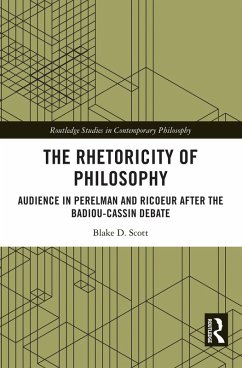
The Exchange of Words (eBook, ePUB)
Speech, Testimony, and Intersubjectivity

PAYBACK Punkte
8 °P sammeln!
The capacity to speak is not only the ability to pronounce words, but the socially-recognized capacity to make one's words count in various ways. We rely on this capacity whenever we tell another person something and expect to be believed, and what we learn from others in this way is the basis for most of what we take ourselves to know about the world. In The Exchange of Words, Richard Moran provides a philosophical exploration of human testimony as a form of intersubjective understanding in which speakers communicate by making themselves accountable for the truth of what they say. The book br...
The capacity to speak is not only the ability to pronounce words, but the socially-recognized capacity to make one's words count in various ways. We rely on this capacity whenever we tell another person something and expect to be believed, and what we learn from others in this way is the basis for most of what we take ourselves to know about the world. In The Exchange of Words, Richard Moran provides a philosophical exploration of human testimony as a form of intersubjective understanding in which speakers communicate by making themselves accountable for the truth of what they say. The book brings together themes from literature, philosophy of language, moral psychology, action theory, and epistemology, for a new approach to this fundamental human phenomenon. The account developed here starts from the difference between what may be revealed in one's speech (like a regional accent) and what we explicitly claim and make ourselves answerable for. Some prominent themes include: the meaning of sincerity in speech, the nature of mutuality and how it differs from 'mind-reading', the interplay between the first-person and the second-person perspectives in conversation, and the nature of the speech act of telling and related illocutions as developed by philosophers such as J. L. Austin and Paul Grice. Everyday dialogue is the locus of a kind of intersubjective understanding that is distinctive of the transmission of reasons in human testimony, and The Exchange of Words is an original and integrated account of this basic way of being informative to and in touch with one another.
Dieser Download kann aus rechtlichen Gründen nur mit Rechnungsadresse in A, B, BG, CY, CZ, D, DK, EW, E, FIN, F, GR, HR, H, IRL, I, LT, L, LR, M, NL, PL, P, R, S, SLO, SK ausgeliefert werden.













